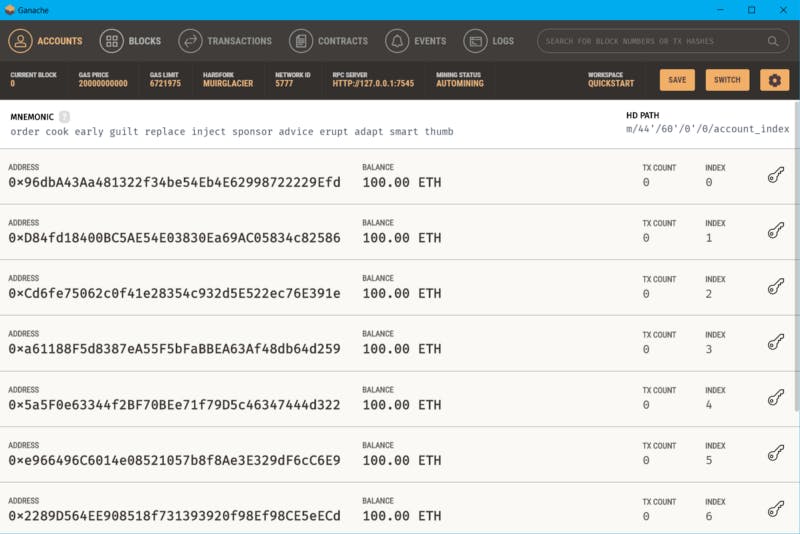API used for communication between frontend and smart contract
learn how to compile and deploy contracts using web3 js API
Background:
In web3 js (Part-II), I discussed how to compile, deploy contracts on remix IDE and interact with smart contracts using web3 js
here’s the link to web3 js (Part-II):
[Web3 js in practical (Part-II)
learn how to interact with smart contracts using web3 js APIbillypentester.medium.com](https://billypentester.medium.com/web3-js-in-practical-part-ii-937b035a8c0c "billypentester.medium.com/web3-js-in-practi..")
Now, we’ll discuss about how to generate abi, bytecode, compile, and deploy smart contracts using the web3 js library.
Pre-requisite:
Some prior knowledge is required related to:
- Advance Javascript (async-await, arrow function)
- Node JS (install, import libraries, FS module)
- Solidity (basics)
Setup environment:
There are multiple tools and options to create and set up blockchain but here are some easy steps to set up everything quickly:
- Initialize npm
create a folder, and open it with vs code or your editor. Type command in terminal:
npm init -y
- Install web3 js library
npm install web3
- Install web3-eth-contract library
npm install web3-eth-contract
- Install solidity compiler and import file system module
const solc = require('solc')
const fs = require('fs')
- setup blockchain
Ganache is a personal Ethereum blockchain that you can use to run tests, execute commands, and monitor transactions.
Download from here: https://trufflesuite.com/ganache/
After installation, open Ganache (quick start):

Coding:
create a file “index.js” in the same folder and write some code.
Import library and initialize provider (ganache network)
const Web3 = require('web3');
const Contract = require('web3-eth-contract');
const solc = require('solc')
const fs = require('fs')
const web3 =
new Web3(new Web3.providers.HttpProvider("HTTP://127.0.0.1:7545"));
Contract.setProvider('HTTP://127.0.0.1:7545');
use the ganache network (RPC server) address in HttpProvider
Read smart contract
const fileContent = fs.readFileSync('demo.sol', 'utf8').toString();
read the smart contract from the external “demo.sol” file
Structure and compile contract
var input = {
language: "Solidity",
sources: {
"demo.sol": {
content: fileContent,
},
},
settings: {
outputSelection: {
"\*": {
"\*": \["\*"\],
},
},
},
};
var output = JSON.parse(solc.compile(JSON.stringify(input)));
Generate ABI , bytecode and create contract instance
ABI =
output.contracts["demo.sol"]["Owner"].abi;
bytecode =
output.contracts["demo.sol"]["Owner"].evm.bytecode.object;
const contract = new Contract(ABI);
Deploy contract
web3.eth.getAccounts((err, accounts) => {
defaultAccount = *accounts*\[0\];
console.log("Default Account:", defaultAccount);
contract
.deploy({ data: bytecode })
.send({ from: defaultAccount, gas: 3000000 })
.on("receipt", (*receipt*) => {
console.log("Contract Address:", *receipt*.contractAddress);
})
.then((*demoContract*) => {
demoContract.methods.candidateName()
.call({from:web3.eth.accounts\[0\]})
.then(function(*result*) {
console.log("Initial Value:", *result*);
})
});
});
here are the complete code files:
[web3/Part-III · billypentester/web3
follow billypentester and help him to grow communitygithub.com](https://github.com/billypentester/web3/tree/main/Part-III "github.com/billypentester/web3/tree/main/Pa..")
Conclusion:
I discussed how to compile and deploy smart contracts using web3 js. There are many other frameworks to deploy smart contracts like hardhat, truffle, etc.
web3 js documentation: https://web3js.readthedocs.io/en/v3.0.0-rc.5/
Wait!!! It’s too much annoying to write many lines of code just to deploy smart contracts.
Use Hardhat or truffle to test, compile, and deploy smart contracts :)
here’s the link to web3 js (Part-I):
[Web3 js in practical (Part-I)
learn basics about web3 js APIbillypentester.medium.com](https://billypentester.medium.com/web3-js-in-practical-part-i-39fbbd65738b "billypentester.medium.com/web3-js-in-practi..")

